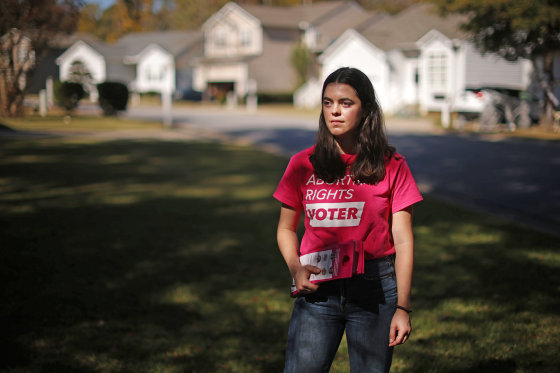RALEIGH, N.C. — On a Wednesday in late October, canvassers wearing hot-pink T-shirts with messages like “abortion rights voter” and “abortion is on the ballot” fanned out across neighborhoods in Wake County and knocked on door after door.
Each had grabbed a stack of door hangers with the message “Vote for your reproductive freedom champions” above the names of candidates.
Technically, abortion is not on the ballot here. North Carolina is one of more than a dozen states that have banned or heavily restricted abortion since Roe v. Wade was overturned and also don’t allow residents to bypass their state legislature to put the issue directly before voters on a statewide ballot. Ten other states currently have it on the ballot, eight through citizen-led initiatives.
But that hasn’t stopped abortion rights supporters from pushing for votes up and down the ballot. From the presidential race — where Donald Trump and Kamala Harris offer two distinct visions on the issue — to the local level, where Democrats hope to break a Republican supermajority in the state legislature.
“Nobody’s really waiting around” for a ballot measure, said Emma Horst-Martz, 28, an organizer with Planned Parenthood Votes South Atlantic. “We think there is a real opportunity to change the legislative makeup so it actually represents the desires and needs of North Carolinians.”
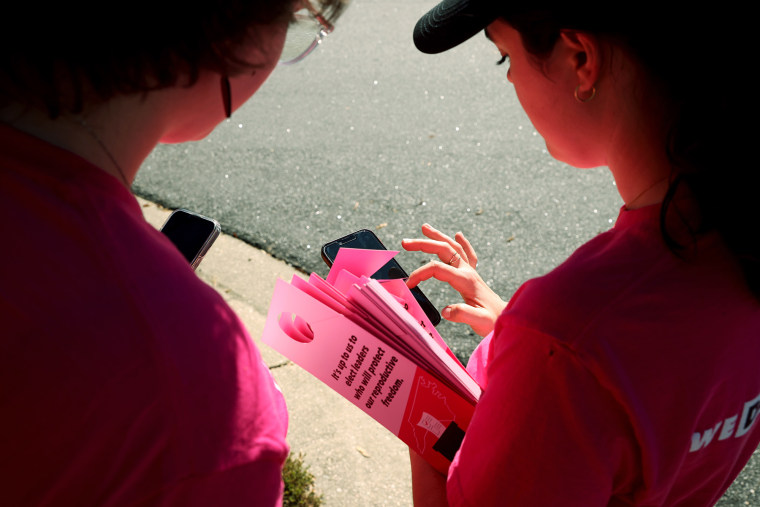
Similar efforts are unfolding in some of the other states with new abortion bans, even without a question about “reproductive freedom” on the ballot. Across the South, supporters of abortion rights are using the issue to motivate voters.
In Georgia, that means trying to elect Harris and state legislators opposed to the state’s six-week ban. In Texas, it means trying to oust conservative judges and helping Rep. Colin Allred, a Democrat who said he would support a federal law protecting abortion, defeat Sen. Ted Cruz.
Activists have spent these final weeks making signs, hosting parties, knocking doors and mailing postcards.
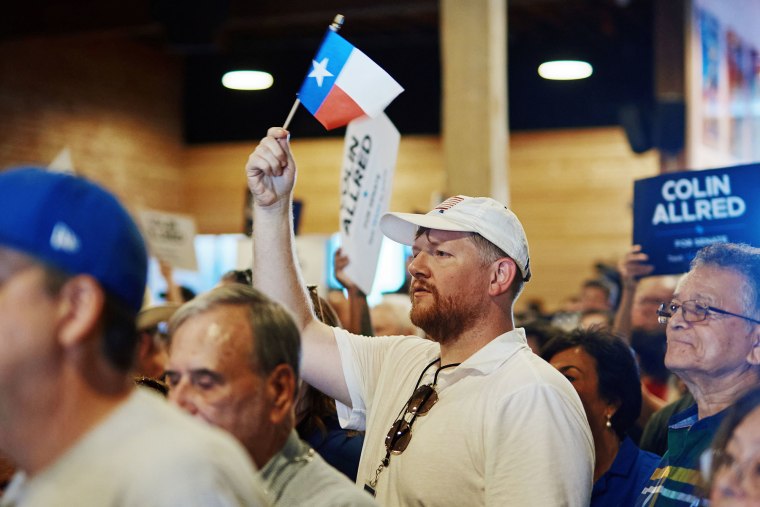
Abortion played a “decisive role” in the 2022 midterms despite predictions that swing voters would be more motivated by economic concerns, explained Diana Mutz, director of the Institute for the Study of Citizens and Politics at the University of Pennsylvania, who has studied voter attitudes.
She expects it could drive votes again this year. It’s easier for Democrats to campaign on the issue, she said, because their party is more united in favor of abortion rights than Republicans are in opposition.
Though the impact of abortion will become clearer after Election Day, she said, losing an existing right can motivate voters. “It was the law of the land for a long time,” she said. “It’s very hard to take that away from people.”
North Carolina is one of only two states in the South where abortions can occur after the sixth week of pregnancy, but the state did enact a 12-week ban last year. At least some public polling indicates the ban is unpopular with North Carolina voters.
A 2023 poll from Elon University found about 45% of respondents were either strongly or somewhat opposed to the state’s ban compared to 23% who were strongly or somewhat supportive.
Lauren Gonzalez, a 32-year-old graduate student keeping a watchful eye on her toddler in a Raleigh park playground, said she wished her state could vote on a ballot measure to protect abortion.
“If anything, I think having a child made me more pro-choice,” she said, after noting that her son was born the same day Roe v. Wade was overturned. “I feel like there has to be choice for the health and safety of families.”
Democratic Attorney General Josh Stein is expected to win this year’s gubernatorial election as his Republican challenger, Lt. Gov. Mark Robinson, remains dogged by controversy, including over comments he’s made on abortion. Stein’s influence could be tempered, however, if the Republicans retain their veto-proof supermajority, achieved in 2023 when a single state representative switched parties. That switch proved pivotal in passing the state’s abortion ban.
Republicans are fighting to keep it. At the North Carolina State Fair last week, amid the rides and concession stands, volunteers at the Wake County GOP booth reminded fairgoers about early voting.
When asked about abortion, Brett Dearing, a Lexington resident who stopped by the booth, said he’d rather the federal government stay out of it. “In my opinion, it’s the state’s job to make up their own rules about those kinds of things.”
Around the corner, brochures and donation jars were on display alongside a basket of rubber fetus dolls at the booth for North Carolina Right to Life.
But Dr. Bill Pincus, the group’s president, said many voters he encountered seemed more focused on immigration or the economy than abortion. “I'm not sure it's the top issue on people’s minds” Pincus told NBC News this week. “I wish it was and that everybody would vote pro-life.”
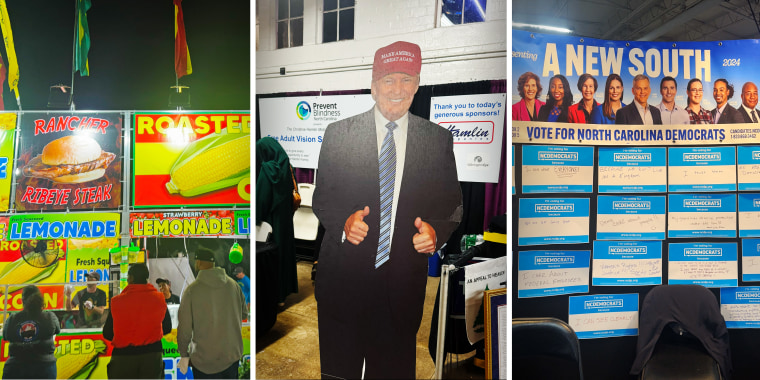
In Texas, Trump is favored to win, but the state’s U.S. Senate race has been more competitive. Allred’s supporters are hoping to oust Cruz, though it’s likely to be an uphill climb.
On the campaign trail, Allred has said he would vote for a federal law protecting abortion rights in all 50 states.
Down-ballot, Texas organizers are also hoping to tap into the backlash against the state’s abortion ban.
“I wouldn’t in any way underestimate the anger of Texas women,” said Gina Ortiz Jones, who launched the Find Out PAC with the goal of ousting three Republican state Supreme Court judges who denied a Texas woman's request for an exception under the state’s abortion law.
The group is running digital ads in some of the state’s most populous cities featuring firsthand accounts from women who were forced to leave the state for treatment during their pregnancies, or grew sicker while waiting for care.
In Amarillo, abortion rights advocates are fighting a ballot initiative that would make it the latest Texas community to try to bar its highways and roads from being used to travel out of state for abortion care. The proposed ban, which legal experts have challenged as unconstitutional, would rely on civil lawsuits for enforcement.
Rachel O'Leary Carmona, executive director of the Women’s March, who is based in Amarillo, said her group, alongside local organizers, was actively campaigning against it.
“There is a real pushback” in the community, she said, “to the way that this ordinance would turn neighbor against neighbor inside of our community.”
Some abortion rights supporters in states without initiatives see a Harris win, combined with state legislative action, as the clearest avenue for change.
In Georgia, which President Joe Biden carried by less than 1 percentage point in 2020, organizers have been canvassing for state candidates who support increased abortion access and might reintroduce legislation to repeal the state’s abortion ban.
The deaths of at least two women — Candi Miller and Amber Nicole Thurman — have been tied to the state’s lack of legal abortion care and an environment of uncertainty around exceptions.
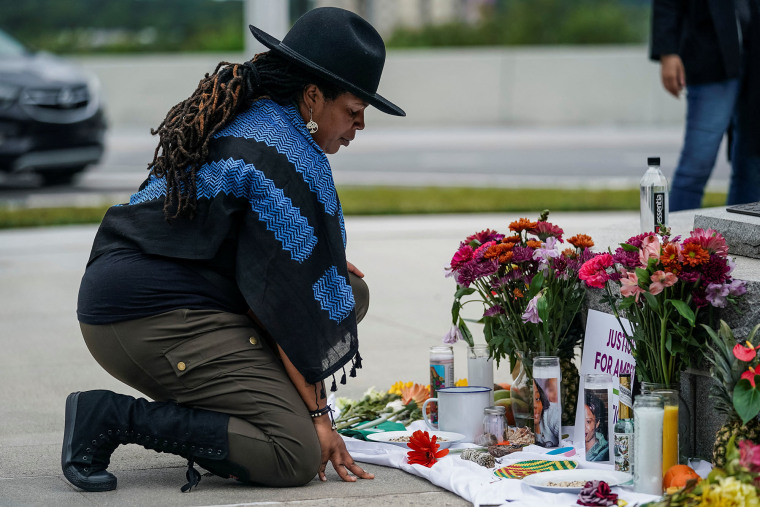
OB-GYNs in the state countered a Trump visit last week with a mobile billboard on the side of a truck announcing that women “can’t afford to wait and see” whether he would sign a national abortion ban if re-elected.
Dr. Mimi Zieman, an Atlanta-based OB-GYN who helped organize the billboard, said one of her patients had struggled to find a provider willing to end her molar pregnancy, which in some cases can cause uterine cancer.
“They’re not getting the results,” she said of the anti-abortion movement. “What they are getting is women suffering along the way. As a practicing physician, I feel like it’s my duty to help remedy that.”
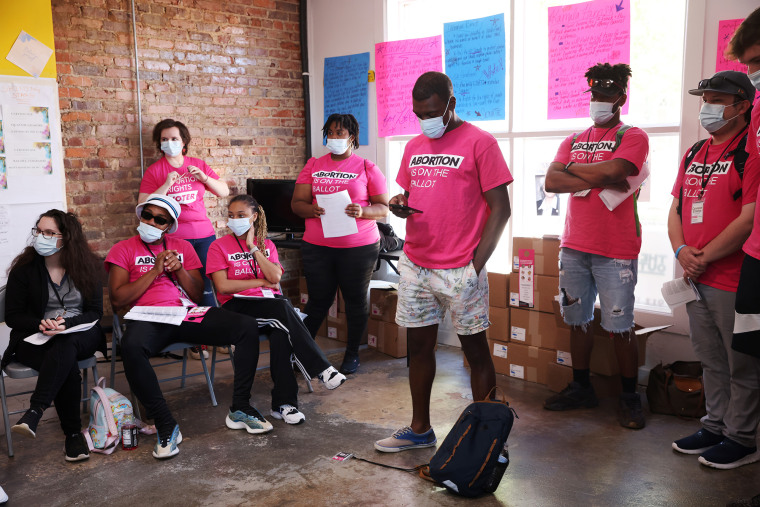
In late October, Horst-Martz drove south from Raleigh, North Carolina, to a Wake County suburb called Fuquay-Varina.
She walked up to a home in a quiet subdivision, the first of 34 she would stop at that afternoon. She knocked, waited a few seconds and left a door hanger with the group’s endorsements.
At the third home, a man answered.
“Do you have a plan to vote?” Horst-Martz asked.
“That’s my own personal business,” he responded.
But others were more welcoming. After speaking to Horst-Martz, Matthew Morman, 33, told NBC News that he was voting for Stein, in part because of his support for abortion rights. Morman said he would also support a direct vote on the issue.
“I do wish it would go to a vote so that the people could talk and put forth their voice,” he said. “Because most of the people we’ve talked to, they’re outraged.”
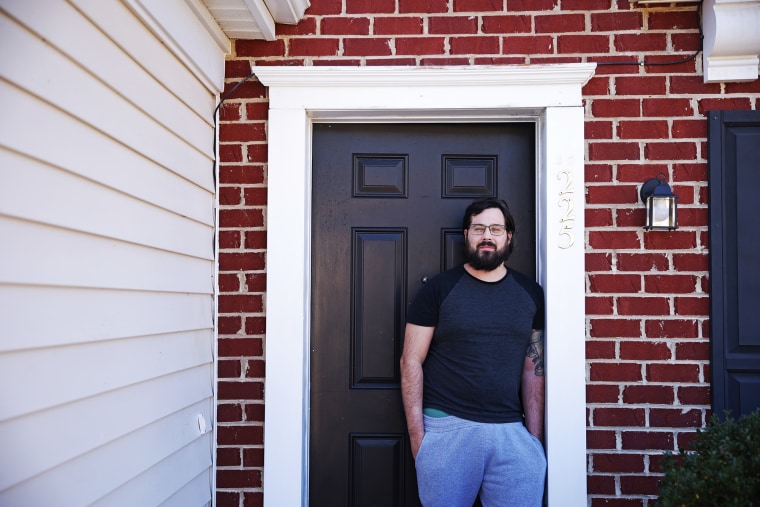
Safiyah Jackson, one of the state House candidates endorsed by Planned Parenthood Votes South Atlantic, has also been knocking on doors. She said it’s been gratifying to meet men, in particular, who consider abortion a top issue.
“It is a growing movement in North Carolina,” she said. “I think it has been and will be a winning issue.”
